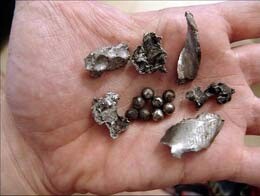IRIN 8 August 2006

Ball bearings and shrapnel from rocket attacks on Israel. (Tom Spender/IRIN)
“These bullets [ballbearings] cause damaging penetrative injuries,” said Dr Eran Tal-or, the attending physician at the trauma unit in Haifa’s Rambam Hospital. “If the bullet is lodged in the brain, for example, we wouldn’t even try to get it out because we would cause even more damage. And if it cuts a major artery, then you will be dead in no time.”
Israel began its military offensive against Lebanon on 12 July after the capture of two Israeli soldiers by Hezbollah, a Lebanese political party with a military wing. In response, Hezbollah has fired thousands of rockets into northern Israel.
On Sunday, a barrage of rockets was fired into a residential neighbourhood in Haifa, Israel’s third largest city, causing three deaths and injuring a number of people.
Dr Tal-or and his team, who tended the wounded, said many of the injuries were caused by the ballbearings. “The rockets are designed to hurt as many people as possible,” he said.
He described the rockets as typically being a metre and a half long and containing a large amount of explosive surrounded by several thousand 5mm ball bearings.
On explosion, these ballbearings are fired out in all directions at high velocity across a distance of several hundred metres, he told IRIN. The ballbearings have punctured metal road signs and lodged deep inside concrete at the sites where Hezbollah rockets have landed.
In a Human Rights Watch (HRW) report, Kenneth Roth, the group’s executive director, said both Israel and Hezbollah were guilty of using indiscriminate force against civilians.
“Lobbing rockets blindly into civilian areas is without doubt a war crime,” said Roth. “Nothing can justify this assault on the most fundamental standards for sparing civilians the hazards of war. War crimes by one side in a conflict never justify war crimes by another. Hezbollah must stop using the excuse of Israeli misconduct to justify its own.”
Related Links
This item comes to you via IRIN, a UN humanitarian news and information service, but may not necessarily reflect the views of the United Nations or its agencies. All IRIN material may be reposted or reprinted free-of-charge; refer to the copyright page for conditions of use. IRIN is a project of the UN Office for the Coordination of Humanitarian Affairs.